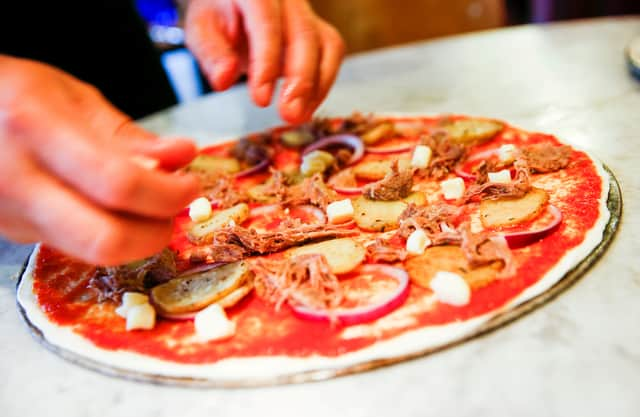Parents say their children are more likely to be honest when eating their favourite meals


Seven in 10 mums and dads reckon they are more likely to have an open conversation with their children over a meal they enjoy - and takeaways top the list of foods.
A study of 2,000 parents of children aged 11 to 18 who attend non-fee paying schools found school life (64 per cent), friends (54 per cent) and family (52 per cent) are hot topics of conversation when they come together to eat.
Advertisement
Hide AdAdvertisement
Hide AdFood behavioural psychologist Dr Suzanna Forwood claims the happiness levels released when children have their favourite foods mean they are more relaxed and likely to engage more with their parents. The expert, who is also an associate professor at Anglia Ruskin University, has teamed up with Talking Futures, an online resource that helps parents talk to children about future education and career options.
She said: "Talking with teens and young adults about their careers and education decisions can be difficult. Planning a regular mealtime where families can catch up over their favourite food can help.
“This is because mealtimes are moments when our body relaxes, and eating our favourite foods produce positive emotions which make us feel safe. All these factors working together help both teens and their parents to open up when they chat, resulting in supportive conversations and a better understanding between both parent and child.”
Creating space for honest conversation
The study also found 87 per cent believe they are more likely to eat together if they order a takeaway. While 88 per cent of parents polled think mealtimes are a good opportunity to have positive and constructive conversations with their children.
Advertisement
Hide AdAdvertisement
Hide AdThe main reasons for this include it being a time when everyone is together (78 per cent), everyone slows down a bit (47 per cent) and the food is a good conversation starter (37 per cent). However, some subjects are still difficult to broach, including death (22 per cent), mental health (16 per cent) and relationships (14 per cent).
But 89 per cent have used mealtimes as an opportunity to talk about specific topics, including careers, with 49 per cent finding it easier to talk more openly about their child’s options when sat having a meal together.
Of those who wish they could have more future career conversations with their children, 53 per cent want to be there for them, while 44 per cent want to provide advice and point them in the right direction.
The study, carried out via OnePoll, found 66 per cent tend to use more light-hearted topics as a starting point, before talking to their child about more important subjects such as their future education and career plans.
Advertisement
Hide AdAdvertisement
Hide AdMichelle Rea, spokesperson for Talking Futures, said: “Parents, carers and guardians play an important role in their children’s further education and career choices, and they have significant influence on the decisions they go on to make. We know it can be hard for many parents to find the right time to talk to their teenagers about these topics.
“But it’s important for parents to have conversations about future career options with their children early on – and to have them on a regular, ongoing basis. With help from Dr Suzanna Forwood, we have pinpointed mealtimes as good time for families to catch up on career options particularly when your teen is enjoying their favourite dish.”
Top mealtime discussions
- School life
- Friends
- Family
- Homework
- Holidays
- Television shows
- Future plans
- Movies
- Upcoming birthdays
- Upcoming holiday celebrations (e.g., Christmas, Easter)
- Relationships
- Sports
- Careers/ future career options
- Video games
- Mental health
- Social media trends
- Exam results
- Physical health
- Celebrities
- The local community
Comment Guidelines
National World encourages reader discussion on our stories. User feedback, insights and back-and-forth exchanges add a rich layer of context to reporting. Please review our Community Guidelines before commenting.